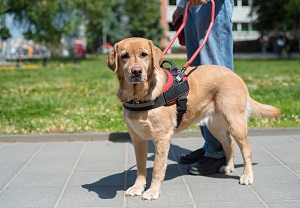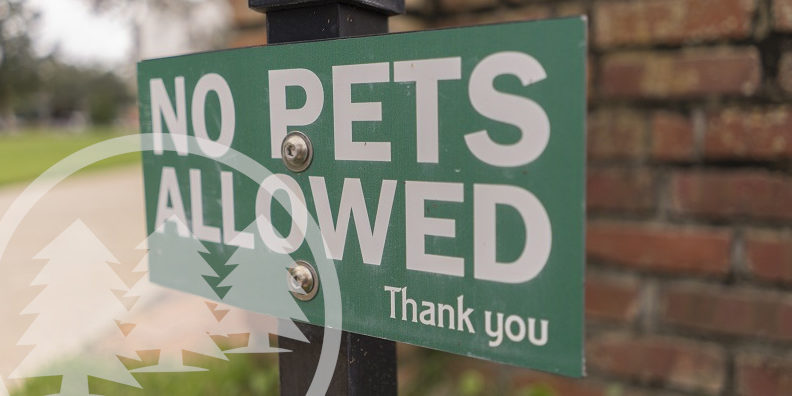Homeowners association pet restrictions are always a difficult issue to deal with. Many residents consider their pets as family members, so pet rules and regulations can evoke strong emotional reactions. However, HOA pet restrictions are necessary for the safety and well-being of the entire community. You need to establish a clear HOA pet policy and properly enforce it. Here’s what you need to know when dealing with HOA pet rules and regulations.
Can You Impose HOA Pet Restrictions?
HOAs are private entities. If the board wants to enforce a “no pets” policy, they are legally able to do so. With over 86.9 million American households with pets, though, HOA pet ownership is on the rise. You may not want to exclude them from your community. It would be much better to have HOA pet restrictions. Just make sure that your HOA dog restrictions, or any pet for that matter, are clearly stated in your pet policy and bylaws. Your pet regulations should be fair and reasonable for the entire community.
Can the HOA Enforce Pet Limits?
 An HOA can enforce pet limits in the community. Your HOA dog rules can have limitations on breed, the number of pets, and maximum size or weight. For example, if the community is comprised of families with a lot of young children, you might want to prohibit dangerous dog breeds, such as pit bulls and rottweilers.
An HOA can enforce pet limits in the community. Your HOA dog rules can have limitations on breed, the number of pets, and maximum size or weight. For example, if the community is comprised of families with a lot of young children, you might want to prohibit dangerous dog breeds, such as pit bulls and rottweilers.
You may also consider an HOA pet weight limit. Larger dogs can incite neighbor fear and cause potential property damage. Some associations may enforce a maximum size of about 25 to 30 pounds. Keep in mind, though, that smaller dog breeds can be just as dangerous, noisy, and messy as the larger dog breeds. When it comes to your HOA limiting the number of pets, most associations may allow for 1 to 2 in each household.
If you decide to enforce pet limits, just make sure that they make sense for your community.
How to Enforce HOA Pet Restrictions?
To ensure proper HOA or condo pet policy enforcement, the community should have clear-cut rules in its bylaws.
1. Pet Rules and Regulations
Pet rules, regulations, and limits should be explicitly stated. The HOA needs to be clear about rules like leashing (are pets required to be tethered or can they roam freely?), spaying/neutering regulations, and proper waste disposal. Your governing documents should also discuss nuisance pet behaviors such as excessive barking, property damage, inappropriate urination, aggressive behaviors, and the like.
2. Pet Registration
 Pet registration will allow the board to properly enforce rules and regulations. The board should be aware of all the animals living in the community. Residents are required to register their pets. You can ask to see the animals in person and take photographs of them for documentation.
Pet registration will allow the board to properly enforce rules and regulations. The board should be aware of all the animals living in the community. Residents are required to register their pets. You can ask to see the animals in person and take photographs of them for documentation.
It’s also important to ask for proof of licensing and ensure that they are up-to-date with their vaccinations. Make it clear to residents that hiding animals is not allowed, especially those that do not comply with HOA pet restrictions.
3. Pet Policy Violations
It is the board’s responsibility to ensure homeowners comply with the HOA pet restrictions. Pet owners who violate these rules should be notified. You can issue a verbal warning or an official letter for first-time offenders. Some residents may forget about your pet restrictions and a gentle reminder can be enough to persuade them.
Pet owners who refuse to comply with HOA pet restrictions will be subjected to sanctions or fines. Just make sure that these consequences are clearly stated in your governing documents. Most of the time, residents will abide by your HOA pet restrictions. If you encounter difficult homeowners, though, you can consult HOA management. An HOA manager can handle cases of non-compliance and can pursue further action.
If a resident’s non-compliance with HOA pet restrictions is threatening the safety of the community, you can pursue legal action. You can file a civil lawsuit for injunctive relief against the offender. The resident will be legally required to comply (such as removing a dangerous pet breed from the community) or risk jail time and fines.
Are There Exceptions to HOA Pet Restrictions?
HOA pet restrictions should apply to all homeowners in the community, but there are a few exceptions, such as:
1. Service Animals
 Under the Fair Housing Act, people with disabilities are allowed reasonable accommodations, such as having a service animal. The HOA cannot impose pet restrictions on these animals. They are not allowed to refuse certain breeds, weights, or sizes. Service animals are also allowed in all areas of the property.
Under the Fair Housing Act, people with disabilities are allowed reasonable accommodations, such as having a service animal. The HOA cannot impose pet restrictions on these animals. They are not allowed to refuse certain breeds, weights, or sizes. Service animals are also allowed in all areas of the property.
As standard practice, the HOA can ask for service animal documentation. They should also explain to residents with disabilities that they are still responsible for the actions or behaviors of their service animals. Residents should be able to control their service animals. They are also expected to follow pet rules such as leashing and will be liable for any damage caused by their service animal.
The HOA may be able to refuse a service animal if there is a direct threat to the health and safety of other homeowners, and no other reasonable accommodation can remedy it. Since this is a delicate issue, the board should decide on a case-by-case basis and consult a legal professional.
2. Grandfather Clause
If your HOA pet policy is new, or the board has made amendments, the changes will generally not apply to the pets that residents already have. You can impose these new HOA pet restrictions if they get new pets, or if new homeowners join the community. Having a grandfather clause allows the board to enforce pet restrictions but won’t cause undue stress on homeowners who wouldn’t want to part with their beloved pets.
The HOA can still have guidelines when it comes to grandfather clauses. For example, the pet exceptions will expire if the homeowner no longer has the animal or if there is a change in property ownership. You should also take note of specific dates to know which animals are truly eligible for the grandfather clause.
Possible Issues with HOA Pet Restrictions
 While they have broad discretion when it comes to HOA pet restrictions, the HOA board may run into trouble if they do not enforce pet rules and regulations even-handedly. The board must impose pet restrictions on all homeowners, and avoid singling out certain pet-owning residents for sanctions or penalties. Inconsistency when enforcing pet-related restrictions may lead to lawsuits or claims of discrimination.
While they have broad discretion when it comes to HOA pet restrictions, the HOA board may run into trouble if they do not enforce pet rules and regulations even-handedly. The board must impose pet restrictions on all homeowners, and avoid singling out certain pet-owning residents for sanctions or penalties. Inconsistency when enforcing pet-related restrictions may lead to lawsuits or claims of discrimination.
The Importance of Abiding by HOA Pet Restrictions
Given the many issues that can arise with pet ownership, it is important for communities to have pet rules and regulations. Homeowners should be free to have pets if they wish, but they must follow HOA pet restrictions to ensure the safety and well-being of the entire community. The HOA board should be fair and reasonable when enforcing restrictions.
In the case of problematic pets, they can issue citations and fines or even pursue the removal of these animals. Since homeowners can be emotional when it comes to their pets, having an HOA manager can help the board deal with these sensitive and complicated cases.
RELATED ARTICLES:
- Service Animals In HOAs: What Does The Law Say?
- What Should You Know Before Moving Into An HOA Community?
- 4 Steps On How Can HOA Enforce Rules






